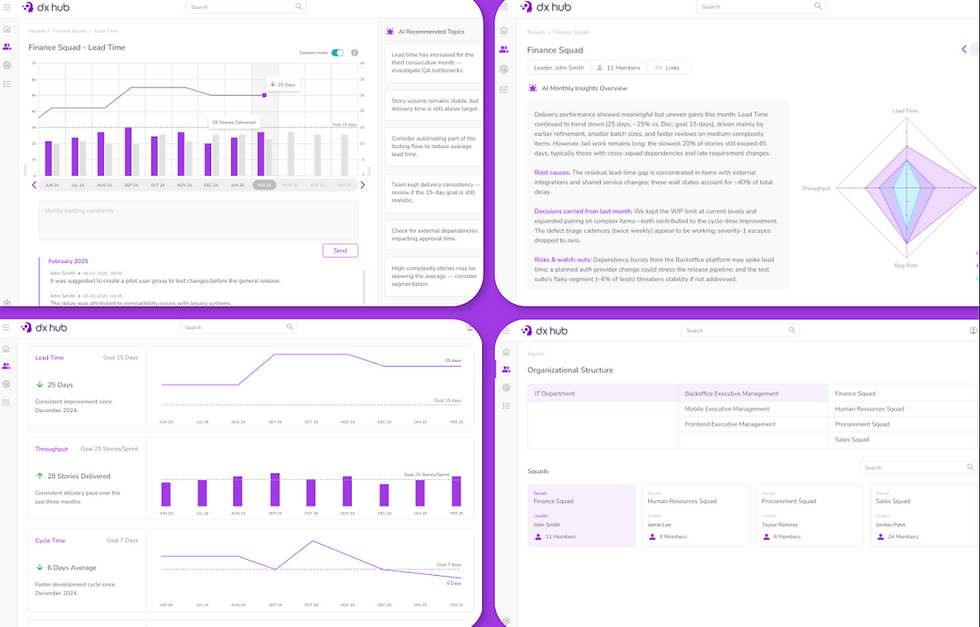Developer Experience in Large-Scale Organizations
- Avalia

- Nov 11, 2024
- 3 min read
Creating a productive and enjoyable work environment for developers is no small task, especially in large-scale organizations where teams are often spread across multiple locations, managing countless projects. Developer experience goes beyond just writing code—it's about empowering developers with the tools, resources, and support they need to work effectively and feel connected to their work. Let's explore some key areas where organizations can make a big difference in enhancing developer experience, even on a large scale.
1. Make Access to Information Easy
One of the biggest challenges in large organizations is access to information. Developers often spend valuable time searching for documents, guidelines, or resources scattered across various systems. Centralizing these resources in a user-friendly portal can save time and reduce frustration. Tools like Backstage allow teams to consolidate project information, documentation, and best practices into a single platform, making it easier for developers to find what they need quickly and focus on coding.
2. Automate Repetitive Tasks
Developers thrive when they can focus on creative problem-solving rather than mundane, repetitive tasks. Automating workflows—such as testing, code reviews, or deployment processes—can improve efficiency and reduce the likelihood of errors. This approach not only speeds up development cycles but also helps developers feel more engaged by eliminating monotonous tasks. Automating with tools like CI/CD pipelines can streamline these processes, enabling developers to work faster and with fewer interruptions.
3. Encourage Knowledge Sharing
In large organizations, it's essential to create a culture of knowledge sharing to avoid siloed teams and isolated know-how. Regular knowledge-sharing sessions, brown-bag lunches, and mentorship programs help bridge gaps between teams and foster a more collaborative environment. By encouraging experienced developers to share their expertise with newer or less-experienced colleagues, companies can build a stronger, more cohesive team.
4. Prioritize Development Tools
Giving developers the right tools can make all the difference in their productivity and job satisfaction. Outdated or inefficient tools slow down workflows and lead to frustration. Investing in high-quality development tools, modern code editors, or optimized infrastructure is a direct way to show developers that their work is valued. Consider conducting periodic surveys to find out which tools developers prefer and where they might see room for improvement.
5. Promote a Sense of Purpose
Working in a large organization can sometimes make developers feel disconnected from the impact of their work. Regularly communicate how their contributions align with the company's goals and mission. Highlighting successful projects, celebrating milestones, and connecting individual tasks to broader objectives can help developers see the value in their work and feel more motivated.
6. Offer Opportunities for Growth
For many developers, continuous learning is essential for career growth and personal satisfaction. Large organizations are in a unique position to provide ample resources for learning and development, from technical courses to conference attendance and certifications. Creating a supportive environment where developers can learn new skills, experiment with new technologies, and advance in their careers is crucial for keeping them engaged and motivated.
7. Foster a Culture of Feedback
Regular feedback is critical for growth and improvement, both for developers and the organization. Setting up feedback loops—such as code reviews, performance evaluations, or peer feedback—allows developers to learn from each other and improve over time. Constructive feedback can help developers refine their skills and feel more connected to their colleagues, contributing to a positive work environment.
8. Support Work-Life Balance
High-performing teams are often built on the foundation of work-life balance. In large organizations, it’s easy for developers to feel overwhelmed by workloads and deadlines. Offering flexible work arrangements, setting realistic deadlines, and promoting a healthy work-life balance show that the organization values the well-being of its developers. This leads to higher job satisfaction, reduced burnout, and a more sustainable, productive team.
9. Measure What Matters
While many organizations focus on output-based metrics like lines of code or number of features delivered, these don't always capture the full picture of developer experience. Metrics that matter, such as time spent on productive tasks, user satisfaction with internal tools, or team morale, can provide a more accurate view of developer experience. Regularly assessing and adjusting these metrics based on feedback allows organizations to continuously improve their developer environment.
Improving developer experience in a large organization is an ongoing effort, but even small changes can have a significant impact. By investing in accessible resources, modern tools, knowledge-sharing opportunities, and a culture of feedback and support, organizations can create an environment where developers feel valued, motivated, and empowered to do their best work. Remember, an organization’s success often depends on the satisfaction and engagement of its developers, making developer experience not just a "nice to have" but a key factor in achieving sustainable growth and innovation.


